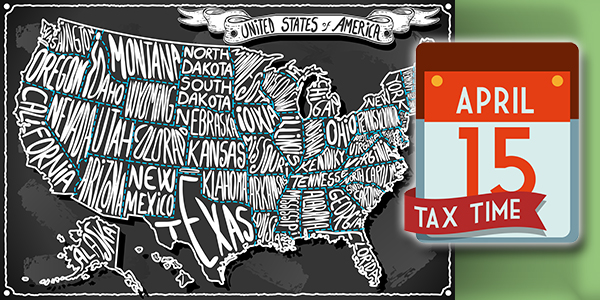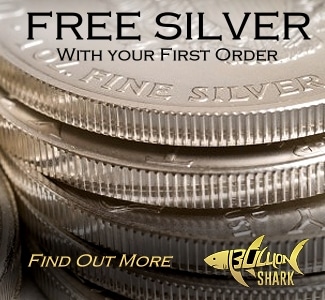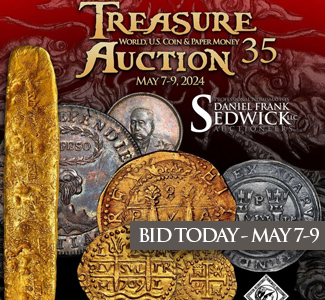
By Ron Drzewucki – www.moderncoinwholesale.com ….
Link to Part 1
In the U.S., sales tax is levied on a state and local level, so there is no one rule that fits all precious metal purchases. The complications wrought by conflict between the tax laws applying to the buyer versus the tax code applicable in the dealer’s location is inefficient and confusing at best, and inhibiting or even legally problematic at worst.
So to help our customers achieve a better understanding of the issue, Modern Coin Wholesale is happy to announce a new series of blog posts dedicated to a state-by-state breakdown of the relevant tax law pertaining to the sale and purchase of coins and bullion products.
As we do so from week to week, please keep in mind that Modern Coin Wholesale is not qualified to dispense legal advice and we are not at any time advocating a particular course of action. We are also not tax professionals. We merely wish to present this information in a relatively easy-to-understand way, enabling you, our customer, to judge for yourself what purchasing decisions are in your own best interest.
We hope you enjoy!
-Ron and the Staff at Modern Coin Wholesale
Idaho
- Sales Tax: none
- Exemption: N/A
Idaho has one of the most generous sales tax exemptions for bullion products and numismatic coins among the 50 states. Precious metals and coins which have been fashioned into jewelry or other artworks that are then sold as such are subject to tax, but that’s a fairly standard clause around the country.
I find Idaho’s exemption interesting in other ways, however. Idaho Statutes specifically mention rhodium and chromium among the bullion metals exempt from tax. No other state so far has found this necessary.
Illinois
- Sales Tax: none*
- Exemption: N/A
Title 86 Part 130 Section 130.1910(c) (source: PDF) of the regulations of the Illinois Department of Revenue categorically states that numismatic coins, medallions and legal tender gold and silver coinage (both foreign and domestic) are exempt from Retailer’s Occupation Tax (sales tax). Bullion products are also exempt.
*The only exception to this is the South African krugerrand, to which the regular state sales tax of 6.25% is applied.
Indiana
- Sales Tax: 7%
- Exemption: none
Indiana has a state sales tax of 7%, though cities are allowed to impose their own local sales tax. However, Indianapolis, Evansville and South Bend (among others that I looked at) charge no additional tax.
The specific application of sales tax to precious metals and numismatic coins can be read here (PDF): http://www.in.gov/dor/reference/files/sib50.pdf. Essentially, if you’re selling from Indiana, you are liable for paying sales tax, and if the coins or bullion being sold are to be stored in Indiana (no matter how temporarily, and regardless of whether you, the buyer, are the owner of said coins or bullion or not), then Indiana sales tax is applicable.
Iowa
- Sales Tax: none
- Exemption: N/A
Bullion “bars, ingots or commemorative medallions” are exempt from sales tax, as are coins and paper currency. Like in the case of Idaho, Iowa law (source: PDF) describes numismatic coins as being made of “gold, silver or other metal”–a potentially confusing phrase.
Kansas
- Sales Tax: 6.5% – 11.25%
- Exemption: none
Kansas is another example of state and local sales tax adding up to quite a bill, depending on where you buy your coins and precious metals. As of July 1, 2015, Kansas applies a rate of 6.5% on all retail sales not exempted by law. City, County and Special District sales taxes may be charged on top of the statewide base rate.
Kansas Administrative Regulations specify that sales tax applies even when the intended use of the coins or bullion purchased is as an investment vehicle and not mere consumption.
What’s more, the local rates change relatively frequently. For a look at recent changes in local sales tax rates in the State of Kansas, click here: http://www.ksrevenue.org/salesratechanges.html.
Kentucky
- Sales Tax: 6%
- Exemption: none
Perhaps surprisingly, if you go by the ideology of its nationally-known politicians, Kentucky charges a 6% tax per retail transaction. There is no exemption for numismatic coins, collectibles and precious metal products.
Thankfully, sales tax law in Kentucky specifies that no local municipality may charge additional sales and use tax.
Louisiana
- Sales Tax: 4% – 11%
- Exemption: ≥ $1,000
Louisiana’s statewide sales tax rate is 4%*, but like a handful of other states in this series cities and other municipalities may also charge a local sales tax. In one case, the combined sales tax is as high as 11% (Lake Providence).
The cumulative tax rate in New Orleans ranges from 4% to 9%, depending on the zip code.
Luckily, the state does allow for exemptions on single transactions of “gold, silver, or numismatic coins, or platinum, gold, or silver bullion” equal to or greater than $1,000.
Sales of paper currency are not exempt from tax.
*Technically it’s 3.97%, with the extra three-hundredths of a percent charged to support the Louisiana tourism district.
Maine
- Sales Tax: 5.5%
- Exemption: none
Maine charges a 5.5% tax rate on single transactions involving numismatic coins (containing precious metals or otherwise) and bullion products (source: PDF). There is no current tax exemption or exemption price level in effect.
Maryland
- Sales Tax: 6%
- Exemption: ≥ $1,000
Maryland charges a 6% tax on all single transactions that occur within the state. In other words, you buy your coins in Maryland, you pay 6% sales tax. However, Maryland residents who purchase coins or bullion out of state may also be subject to the state’s 6% use tax.
I only use the word “may” because I am not a lawyer nor am I an expert on Maryland state taxes, so there could be situations where a resident of Maryland would NOT have to pay use tax and I am simply not aware of them. In all likelihood the 6% use tax would still apply.
Single purchases of “precious metal bullion or coins” where the sale price is greater than $1,000 are exempt from sales and use tax.
Massachusetts
- Sales Tax: 6.25%
- Exemption: ≥ $1,000
In Massachusetts, coins and precious metal bullion products are subject to a state tax of 6.25%. For collectible coins and gold and silver bullion, transactions of $1,000 or greater are exempt from sales tax.
Other precious metals, such as platinum and palladium, are not exempt.
Legal tender gold and silver coinage from around the world is also exempt from sales tax whenever a single transaction totals $1,000 or more… with the exception of coins from South Africa and Namibia.
It should be clear by now that several punitive anti-apartheid-era laws are still in place. Until these statutes are amended or repealed in respect to numismatic items and gold and silver bullion, customers will have to pay sales taxes on these products in many states.
Michigan
- Sales Tax: none
- Exemption: N/A
Coins and bullion are exempt from Michigan’s sales tax.
The interesting thing is that instead of using the term “collectible” or “numismatic”, Michigan state code refers to such coins as “investment coins”. Section 205.54s of the General Sales Tax Act of 1933 defines investment coins as:
“[N]umismatic coins or other forms of money and legal tender manufac-tured of gold, silver, platinum, palladium, or other metal and issued by the United States government or a foreign government with a fair market value greater than the face value of the coins.”
Bullion covers the usual fare (with gold, silver and platinum specifically mentioned), though for the purposes of determining tax exempt status, bullion purity cannot be below 90% or .900 fine.
Minnesota
- Sales Tax: ≥ 6.875%
- Exemption: none
Minnesota charges a sales and use tax of 6.875% on all single transactions of coins and precious metal bullion products. The state also allows cities and counties to levy additional sales and use taxes on top of the statewide base rate. Additionally, these local rates are constantly changing; visit the Minnesota Department of Revenue’s sales tax calculator page for more information.




